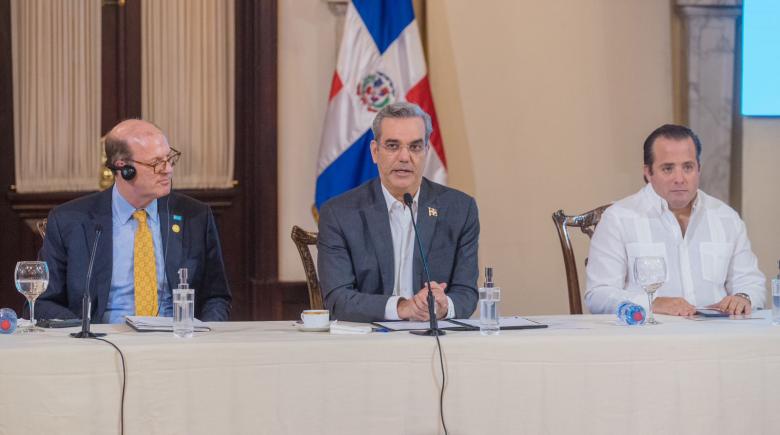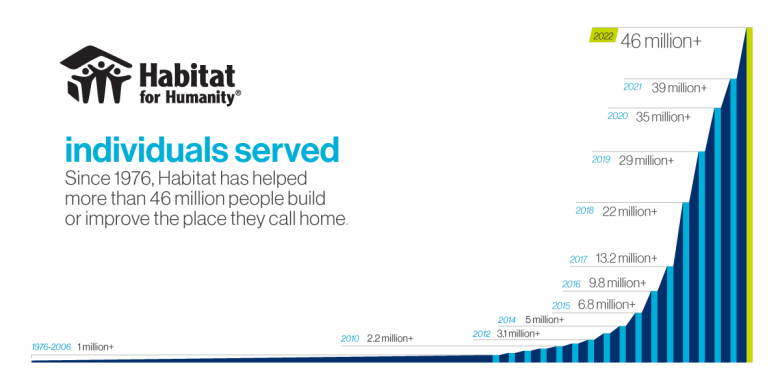Habitat for Humanity leverages advocacy and innovation to expand and advance housing solutions in communities around the world
The nonprofit’s 2022 annual report highlights programs and initiatives that helped 7.1 million people gain greater access to safe, decent and affordable housing
ATLANTA (Nov. 22, 2022) — A concrete floor is a measure of safety, comfort, employment and empowerment for homeowner María Natalia of San Juan Sacatepéquez, Guatemala. With it, she knows that her 2-year-old daughter can toddle around and play without fear of the major health hazards that come along with a dirt floor, which is still the reality for 6% of households across Latin America and the Caribbean. María Natalia, who kneels on the floor as she weaves cloth in her home to earn a living, can also now avoid inhaling dust and feeling small stones grinding into her skin as she works.
This year, she and her family became one of the many to be served by a new initiative launched by Habitat in partnership with the Inter-American Cement Federation to install 100,000 concrete floors across the region by 2028. Her story and the “100,000 floors to play on” initiative are documented in detail in Habitat’s FY2022 annual report, released today by the global housing nonprofit, which also highlights Habitat’s role as innovator, partner and catalyst for increasing access to affordable, safe and decent housing around the world.

Habitat CEO Jonathan Reckford meets with Luis Abinader, President of the Dominican Republic on Monday. Also pictured at far right, José Ignacio Paliza, administrative minister of the presidency of the Dominican Republic.
In 2022, Habitat for Humanity helped more than 7.1 million people build or improve a place to call home. An additional 5 million people gained the potential to improve their housing conditions through local training programs and advocacy work fueled by Habitat in local communities. Habitat also contributed to successful policy and systems change that improved access to adequate and affordable housing in 14 countries.
“This year, our staff, supporters, volunteers and advocates demonstrated an unwavering sense of duty and dedication to our vision of a world where everyone has a decent place to live,” said Jonathan Reckford, CEO of Habitat for Humanity International. “It is this steadfast faith, persistence and drive that compels us to innovate and grow in ways that foster greater access to the opportunity we all need and deserve. The incredible work we’ve been able to accomplish this year, despite economic uncertainty roiled by an ongoing pandemic, war abroad and increasingly severe weather events, is a critical reminder that no matter what, we will find a way home.”
With the continued support of Habitat’s generous partners and donors, and a transformational gift from American author and philanthropist MacKenzie Scott, Habitat piloted innovative new programs and expanded others that address the most pressing housing challenges of our time.
The growing impact of climate change continues to disproportionally impact socially and economically vulnerable populations, especially those living in informal settlements and substandard housing. Recognizing this, Habitat called for a multi-lateral mitigation and adaptation approach that protects communities and natural habitats, embraces cost-effective carbon mitigation solutions in built environments and promotes long-term commitments to post-disaster recovery solutions.
Habitat’s Terwilliger Center for Innovation in Shelter continued to be leader in market-based solutions through support of innovative housing products, services and financing. In 2022, for example, the Terwilliger Center helped form the Artificial Sand Manufacturers Welfare Association in India’s Tamil Nadu state to ensure that the rapid growth of manufactured sand facilities does not compromise the quality of the resource. Manufactured sand serves as a sustainable, high-quality alternative to river sand. Though river sand is the preferred raw material for concrete filling, the mining process can devastate aquatic ecosystems, dry up waterways and ultimately deplete this natural resource.
Habitat also deepened its commitment to increasing homeownership opportunities for Black individuals and Black families, through new and existing programs designed to help close the growing racial homeownership gap in the U.S. The organization also launched a strategic framework for diversity, equity and inclusion to better foster and ensure a diverse workforce and inclusive culture. Additionally, the organization’s newly opened Africa area office will help more intentionally scale and promote housing solutions that address that region’s most pressing needs.
Response to natural and manmade disasters is a recurring focus in Habitat’s work, as reflected in the report. In February, millions of refugees fleeing war in Ukraine found themselves in need of safe shelter across neighboring Poland, Romania, Hungary and Slovakia. Habitat stepped up to meet the need of those displaced by distributing emergency travel kits and helping families secure short-, mid- and long-term accommodations. Today, the organization continues to provide shelter-related services to refugees in each country as well as in Germany.
“None of this could have been possible without the more than 700,000 volunteers who helped build, advocate and raise awareness about the global need for shelter in the past year,” Reckford said. “To all of you, we are so incredible grateful for your support and passion for the mission.”
The FY2022 annual report also provides detailed information about Habitat for Humanity International’s activities and financials for the period between July 1, 2021 – June 30, 2022, and the network of Habitat affiliates in all 50 states in the U.S., and national programs in more than 70 countries.

In fiscal year 2022, Habitat reported US$449 million in revenue, along with an estimated US$2.1 billion in total revenue through the organization’s federated network of Habitat organizations in the U.S. and around the world. The audited financial statements are published alongside the annual report at habitat.org/about/annual-reports-990s.
About Habitat for Humanity
Driven by the vision that everyone needs a decent place to live, Habitat for Humanity found its earliest inspirations as a grassroots movement on an interracial community farm in south Georgia. Since its founding in 1976, the Christian housing organization has since grown to become a leading global nonprofit working in local communities across all 50 states in the U.S. and in more than 70 countries. Families and individuals in need of a hand up partner with Habitat for Humanity to build or improve a place they can call home. Habitat homeowners help build their own homes alongside volunteers and pay an affordable mortgage. Through financial support, volunteering or adding a voice to support affordable housing, everyone can help families achieve the strength, stability and self-reliance they need to build better lives for themselves. Through shelter, we empower. To learn more, visit habitat.org.